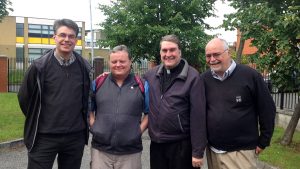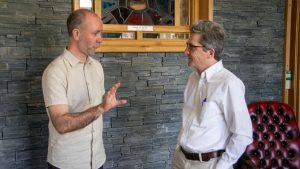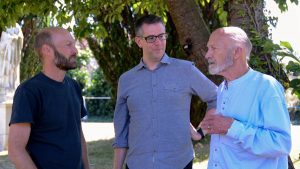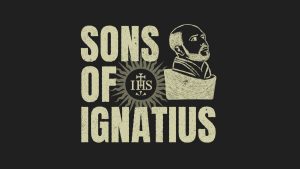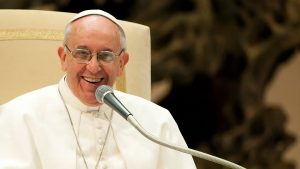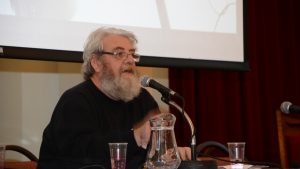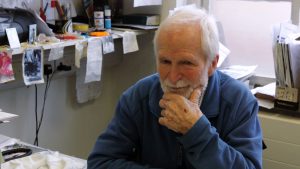Angles on Hugh O’Flaherty
 Jesuit Archives and Todd Morrissey SJ helped TnaG make a documentary on Mgr Hugh O’Flaherty, the extrarodinary Kerry-born, Mungret-educated priest who saved the lives of thousands of Jews and Allied prisoners from the Nazis. Our picture shows him as a senior apostolic (he was already a qualified teacher) in the 1919 Mungret Annual. His obituary, in the 1964 annual, is curious: no mention of Jews (though he was the first Irishman to be hailed by Israel as “Righteous among the Nations”); just a grudging reference to his relief of suffering among escaped prisoners, followed by an expansive paragraph about his golfing prowess. Read on:
Jesuit Archives and Todd Morrissey SJ helped TnaG make a documentary on Mgr Hugh O’Flaherty, the extrarodinary Kerry-born, Mungret-educated priest who saved the lives of thousands of Jews and Allied prisoners from the Nazis. Our picture shows him as a senior apostolic (he was already a qualified teacher) in the 1919 Mungret Annual. His obituary, in the 1964 annual, is curious: no mention of Jews (though he was the first Irishman to be hailed by Israel as “Righteous among the Nations”); just a grudging reference to his relief of suffering among escaped prisoners, followed by an expansive paragraph about his golfing prowess. Read on:
Monsignor Hugh O’Flaherty
(Years in Mungret: 1918-1922)
Hugh O’Flaherty came to Mungret as a late vocation, being already a qualified teacher. After his Philosophy studies here, he went to Propaganda College, Rome, for his Theology, and was ordained for the Diocese of Cape Town in 1925. In passing we may mention that by his incorporation into the Vatican service he was precluded from ever joining his diocese. During his studies he attracted the attention of the then Rector of Propaganda, Monsignor Dini, who appointed him, after his ordination, Vice-Rector of the College. When Monsignor Dini was appointed Apostolic Delegate to Egypt, he brought Father O’Flaherty with him as his secretary. The newly appointed Delegate died unexpectedly after a short time at his new post, and his young assistant had to take over the duties of chargé d’affaires of the Legation at short notice. Nothing daunted, Hugh, now a Monsignor, carried out his duties with great efficiency.
From Egypt he went to Haiti, where he remained until 1936. Returning to Rome in that year, he was transferred from the service of the Secretariate of State to the Holy Office, where he was to remain for the rest of his active life in the service of the Holy See. He was highly thought of by Monsignor, now Cardinal Ottaviani, who was not only a benign superior but a close personal friend of his. During the twenty odd years that he remained in the Holy Office Monsignor O’Flaherty went from the bottom rung of the ladder to the post of Head Notary. In 1960, through failing health which culminated in a stroke, Monsignor O’Flaherty left the Vatican service and took a pastoral assignment in America. But the effects of his stroke soon made active work impossible, and he returned to Cahirciveen, to live with his sister, Mrs. B. Sheehan, until his death in November, 1963.
In spite of his late start in ecclesiastical studies, Monsignor O’Flaherty never lost his interest in the academic side of his career, and in the course of his life he acquired the degrees of D.D. and D.C.L.
Hugh O’Flaherty was above all a generous, honest-to-God Irishman without guile. His big heart was open to any and every distress, and he was lavish in his efforts to assuage suffering in any form, a facet of his character which made him an easy target for any hard-luck story. His expenditure on charity must have been immense, and his motto always was “cast your bread upon the waters”.
His part in the relief of suffering among escaped prisoners during the war – for which many nations decorated him – has been written up and coloured by journalists to a point where even we who lived with him at the time find it hard to discern fact from exaggeration. He was the first himself to discount such stories, and his motives and actions have been grossly misconstrued. There was nothing of the irresponsible Pimpernel in Hugh O’Flaherty. He was first and foremost a priest, and he was ready to succour those in distress, whatever their party or national alignment.
In his boyhood he had become a proficient golfer and although having no opportunities to practice, remained throughout his life a very competent performer. When in Haiti, he secured diplomatic concessions from an American Admiral through his excellent golf, and when he stole an occasional game at the Roman course, his golfing prowess impressed, for the glory of God, such important members of that exclusive club as King Alfonso of Spain and Count Ciano. For Latin laymen of exalted rank, a scratch or near-scratch priest golfer is a potent lesson in apologetics!
Monsignor O’Flaherty’s career in the Vatican service was not without its checks and frustrations. But with his sunny disposition he was proof against such embarrassments. And above all one could say of him that, without ostenta¬tion, his life was always ordered to using his powers, in fair weather or foul, for the glory of God. Can any of us hope to achieve more?





